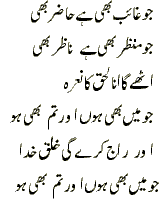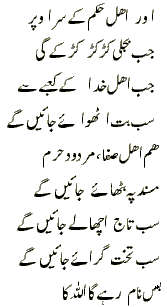 Adil Najam
Adil Najam
The very first blogpost on ATP was the video tribute to Pakistan I had made using Faiz Ahmed Faiz’s classic poem ‘hum daikhain gay...’ This was not just blatant self-projection — although it was that too. It was an expression of my hopes and concerns, an acknowledgement of my gratitude to Faiz’s poetry, and in many ways a ‘statement of purpose’ for this blog.
 A number of people have asked me to post an English translation of the poem ‘hum daikhain gay...’ There are, of course, many available translations of this classic work. But I wanted to share a new one with you. This is by Maniza Naqvi and I find this particularly powerful because it is simple and true to the original words and yet is able to also convey the intensity of poem’s intent. Translating poetry is never easy. Here is a good example of how it should be done.
A number of people have asked me to post an English translation of the poem ‘hum daikhain gay...’ There are, of course, many available translations of this classic work. But I wanted to share a new one with you. This is by Maniza Naqvi and I find this particularly powerful because it is simple and true to the original words and yet is able to also convey the intensity of poem’s intent. Translating poetry is never easy. Here is a good example of how it should be done.



We shall see/certainly we, too, will see/
that day that has been promised us
When these high mountains
Of tyranny and oppression/ turn to fluff
And evaporate
And we oppressed
Beneath our feet will have
this earth shiver, shake and beat
And heads of rulers will be struck
With crackling lightening and
thunders roar.
When from this God’s earth’s (Kaa’ba)
All falseness (icons) will be removed
Then we, of clean hearts–condemned by zealots those keepers of faith,
We, will be invited to that altar to sit and Govern–
When crowns will be thrown off–and over turned will be thrones
We shall see/certainly we, too, will see
that day that has been promised us
Then God’s name will remain (Allah will remain)
Who is invisible and visible too
Who is the seer and and is seen
Then will rise one cheer———I am God!
Who I am too
And so are you
Then the masses (Khalq e Kuda) people of God will rule.
Who I am too
and so are you
Then will rise one cheer———I am God!
Who I am too
And so are you
(Translation by Maniza Naqvi)
 You will find much written on Maniza on the web–for example, here, here and here. She works at the World Bank, lives in Washington, DC, and is an active intellectual whose works include (apart from others) ‘Mass Transit‘ (a novel based in Karachi about the emotional consequences of mass migration and “an immigrant population which never really assimilates”) and ‘On Air‘ (another novel where the plot unfolds over a six-hour period in which the main character,
You will find much written on Maniza on the web–for example, here, here and here. She works at the World Bank, lives in Washington, DC, and is an active intellectual whose works include (apart from others) ‘Mass Transit‘ (a novel based in Karachi about the emotional consequences of mass migration and “an immigrant population which never really assimilates”) and ‘On Air‘ (another novel where the plot unfolds over a six-hour period in which the main character,  Naz, tells stories to listeners and callers over the radio on a late night talk show slot that she has been offered to fill for just one night).
Naz, tells stories to listeners and callers over the radio on a late night talk show slot that she has been offered to fill for just one night).
In reviewing ‘On Air’, Asif Farrukhi, writes:
Post-nuclear Pakistan is a medley of voices–the enigmatic female host of a phone-in talk show discovers as opinions abound, pizza, hijab, recipes which are a part of culture and not sectarianism, come together in a compelling narrative… A welcome addition to the stunted list of Pakistan’s writers in English, Maniza Naqvi is a name to look out for.


















































To Maniza (The translator):
First of all thank you for taking the time to translate this. Great work. But I would like to clarify one line:
Then we, of clean hearts–condemned by zealots those keepers of faith,
You translated “Ahl-e-Suffa, Mardood-e-Haram” as above.
However, the above line references “Ahl-e-Suffa”. Ahl-e-Suffa were the very poor, orphans, beggars and homeless who used to live on the large platform (Suffa) in front of the Holy Prophet (saw)’s house. These were the ‘mardood’ of the city who never got anything. They were rejected from society. When Islam came, it raised their status as being a ‘Sahaba’. Hence when Faiz says, “Hum Ahle-e-Suffa mardood-e-Haram, Maslak Pe Bitthaay jaain ge’ he is referring to them as before Islam, they were the outcasts, but after the Truth came, they became Sahabi and Quran put them on a very high position.
Just my two cents.
Sorry if I offended anyone…
To Farzana, who translated “Hum dekhain gay”. Brilliant job. As a student and humble follower of Faiz, I will try to add my interprepation when sharing with others but the first draft translation effort is always the most creative and difficult. We as a nation have no contemporary literary presence. If people like Faiz cannot inspire us to struggle for higher pursuits, nothing ever will. Let us spread his message far and wide.
Submissions Wanted:
We seek submissions for the first issue of Pakistaniaat: A Journal of Pakistan Studies to be published in June 2009. Please submit your scholarly articles, creative works (fiction, creative nonfiction, and poetry), or book reviews that focus on some aspect of Pakistan or Pakistani culture. We read all year.
Pakistaniaat Weblink: http://pakistaniaat.org
THANK You! Also to Farzana!
Just what I was looking for!! I’m Pakistani but my urdu is poor, Westernized-Paki much? :( But thanks you! ANd Much love!
kaas k Faiz aaj zinda hotey … tou shayad humey bhi un k charan chooney ka moka mil jaata… Mehboob ki shaan main tou her shaYir hi likhta hai… Faiz ji ne qoum aor mulk ka dard lafzon main dhaal diya aor is sach likhney per kitni baar unhey salaakhon k paar rehna para…
Faiz ji Mahan thay.